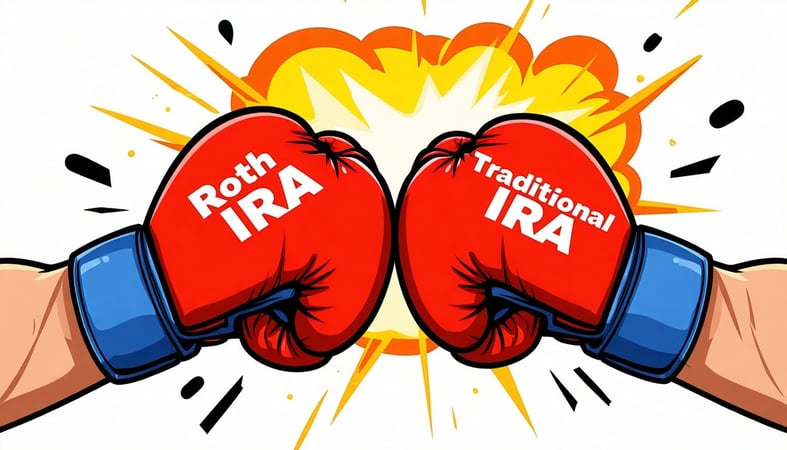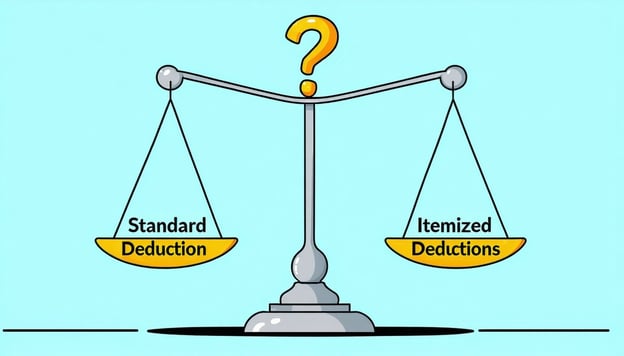Traditional vs Roth IRA

Dear Friend in Finance,
I keep hearing about IRAs and their tax benefits, but I feel completely lost. Traditional IRAs save you money now, Roth IRAs save you money later—what does that even mean? And how do I know which one is right for me? I’m stressed about making the wrong choice and messing up my retirement plan. Help!
Sincerely,
Panicked Planner
Dear Panicked Planner,
It’s completely understandable to feel overwhelmed—IRAs come with all kinds of rules, and most people weren’t taught this stuff in school. You’re definitely not alone in feeling confused about how they work or which one is right for you. The good news? These accounts are actually pretty similar once you get the hang of them—and they can both be incredibly powerful tools for your future.
The most important thing to know is that both Traditional and Roth IRAs are tax-advantaged accounts. That means they come with special tax benefits, which help your money grow faster over time. They don’t let you avoid taxes completely (we should all be so lucky), but they do help you avoid some taxes—leaving more money in your pocket over the long run.
Let’s start with what they have in common:
You can contribute to either type of IRA up until Tax Day of the following year. So, for the 2024 tax year, you can make contributions all the way until April 15, 2025. That’s a nice bit of flexibility if you're still getting your financial ducks in a row.
There's a limit to how much you can contribute each year—in 2025, it's $7,000 if you're under 50, or $8,000 if you’re 50 or older (thanks to a little bonus called a “catch-up contribution”). These limits apply across both IRAs, so if you contribute to both in the same year, the total has to stay within that cap.
One of the biggest shared benefits is that you don’t pay taxes on the growth inside the account. So if your investments go up in value, you're not paying taxes on those gains each year like you would in a regular brokerage account. That tax-free compounding is a major superpower when it comes to long-term investing.
Both IRAs also penalize early withdrawals. In general, if you take money out before age 59½, you'll pay a 10% penalty—plus taxes, depending on the type of account. There are some exceptions (like for first-time home purchases or qualified education expenses), but as a rule of thumb: these accounts are meant for retirement, not short-term spending.
Now for the key difference:
- A Traditional IRA gives you a tax break now. When you contribute, you may be able to deduct that amount from your taxable income, which can lower your tax bill this year. But the trade-off is that you’ll pay taxes later—when you withdraw money in retirement, it’s taxed as regular income.
- A Roth IRA works the opposite way. You don’t get a tax deduction now, but your withdrawals in retirement are completely tax-free. That includes both your contributions and the earnings. It’s like paying taxes on the seed instead of the harvest.
One other difference to keep in mind: Traditional IRAs require you to start taking money out later in life, even if you don’t need it. These are called Required Minimum Distributions (RMDs). They kick in at age 73 and are the government’s way of saying, “Hey, we gave you a tax break—you need to start paying up.” Roth IRAs, on the other hand, don’t have RMDs during your lifetime, which gives you more flexibility in retirement.
So which one is better? It depends on your situation. If you expect to be in a lower tax bracket in retirement, a Traditional IRA might make more sense. If you think your tax rate will be higher later, a Roth could be the better fit.
These days, Roth IRAs have become extremely popular with influencers. However, there's a bit more nuance than they typically say. And it doesn’t have to be either/or. If you’re eligible, you can use both to diversify your tax situation.
Whichever you choose, pat yourself on the back for taking advantage of this powerful tool. If you're still feeling worried about making the right call, speaking with a financial advisor can give you more certainty.
Hope this clears things up a bit! You’re doing great by asking these questions now—it’ll pay off in the long run.
Sincerely,
Your Friend in Finance
.png?width=100&height=100&name=image0(1).png)



